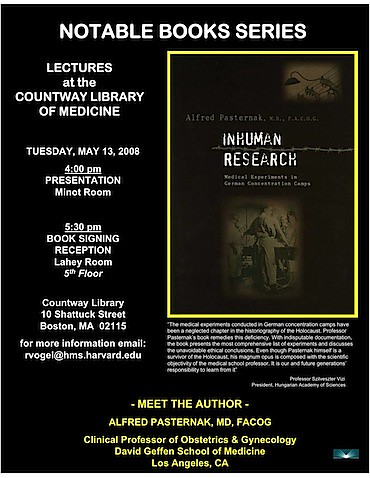This recent announcement of the lack of efficacy of a widely prescribed "cholesterol lowering" combination (two drugs) agent should give us pause. Those of us who practice medicine know all too well how much of what we do is art and not science. Despite billions of dollars of research that linked blood biomarkers such as LDL and CRP to heart disease, we now have a well-run trial that seems to show that the lowering of these "bad" biomarkers does not affect thickening of the walls of arteries in a manner previously thought to result in disease. This once again points to the importance of unimpeachable curation of medical evidence and its clear and untrammeled communication to patients and providers alike.
Harvard Medical School's Countway Library of Medicine and the new frontiers in biomedical computing
2008-03-31
2008-03-27
No sound before its time?
This late breaking story about the recovery of the sound of a French recording, predating Edison's famous recording has relevance to our modern efforts in digital document archiving. Apparently, Edouard-Leon Scott was able to record sound but not in a way that his contemporaries could play back. It makes the point that archives that do not provide for an immediate "read out" can easily be lost to posterity even if they are physically durably accessible. This is the distinction between light and dark archives.
2008-03-23
Notable Book: Inhuman Research, 5.13.08
Every year, we showcase 3-5 notable books. This one, written by Alfred Pasternak, I discovered through the outreach efforts of the Wiesenthal Museum for Tolerance in LA. Dr. Pasternak will be joining us on May 13th for a presentation at 4pm, followed by book signing. He will be accompanied by Ms. Liebe Geft, the director of the Museum of Tolerance, so I am quite sure it should make for a very interesting couple of hours.

2008-03-16
Large-scale extraction of gene-level physiology from the bibliome
Technorati Tags: Informatics, Scholarship
Absence of a plan
Technorati Tags: archives, Collections, Open Access
2008-03-05
HMS Rewind: Harvard Medical School 1997
Technorati Tags: archives, Collections, History, Scholarship
2008-03-03
Do we have enough informaticians?
Technorati Tags: academics, Informatics
Reference your open access articles for your NIH grants starting April 11th.
Technorati Tags: academics, Open Access